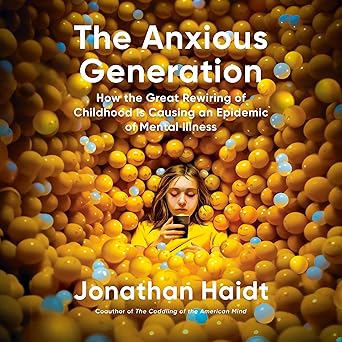
The alarming truth about the state of mental health among teenagers is revealed in this thought-provoking book. In the early 2010s, the mental health of adolescents began to decline dramatically, with rates of depression, anxiety, self-harm, and suicide more than doubling on many measures. This sudden and drastic change has left many parents, educators, and healthcare professionals searching for answers.
The author, a social psychologist, delves into the world of childhood, exploring the reasons behind the dramatic decline in mental health. He argues that the "play-based childhood" that was once the norm has given way to the "phone-based childhood," where children spend more time interacting with screens and social media than engaging in physical play and independent exploration. This shift, he claims, has severe consequences for children's social and neurological development, including sleep deprivation, attention fragmentation, addiction, loneliness, social contagion, social comparison, and perfectionism. The author also highlights how social media can have a particularly damaging impact on girls, who are more susceptible to the pressure to present a perfect online image.
The author's diagnosis is clear: the "collective action problems" that trap us need to be addressed in order to protect our children and ourselves. He proposes four simple rules that could help to restore a more humane childhood, including encouraging independent play, setting limits on screen time, and promoting social-emotional learning. The book is a call to action, urging parents, teachers, schools, tech companies, and governments to work together to end the epidemic of mental illness and create a healthier, more compassionate society. With its compelling arguments and clear solutions, this book is a must-listen for anyone concerned about the well-being of our children and their future.
This book is a deeply unsettling and thought-provoking read that leaves you with more questions than answers. As someone who remembers the carefree days of playing outside until the streetlights came on, it was striking to see how vastly different childhood has become. The author's claims that children are spending more time staring at screens than engaging in physical play and independent exploration feels uncomfortably true. I recall a conversation I had with my young niece, who confides in me about the pressure to present a perfect online image, only to be bombarded with unrealistic expectations from a young age.
The book highlights how this shift in childhood can have severe consequences on social and neurological development, including sleep deprivation, attention fragmentation, addiction, loneliness, social contagion, social comparison, and perfectionism. What struck me was how these issues seem to disproportionately affect girls, who are often more susceptible to the pressure to conform to societal norms. The author's argument that social media is a major contributor to this phenomenon is well-reasoned and supported by evidence. I was particularly moved by the story of a young girl who took her own life, and how her actions were likely fueled by the toxic message that bombards her on social media every day.
The author's proposed four simple rules for restoring a more humane childhood feel like a breath of fresh air. By encouraging independent play, setting limits on screen time, and promoting social-emotional learning, we can help to rewire our children's brains and create a healthier, more compassionate society. The book is a clarion call to action, urging parents, teachers, schools, tech companies, and governments to work together to address this growing epidemic of mental illness. As someone who has witnessed the devastating effects of mental illness firsthand, this book has left me feeling both hopeful and deeply concerned. Can we truly make a difference, or will we continue to perpetuate the cycle of suffering that plagues our children? Only time will tell.
Rating: 3.4 / 5.0
This book is a deeply unsettling and thought-provoking read that raises important concerns about the state of mental health among teenagers. The author's arguments are compelling and well-supported by evidence, highlighting the alarming truth about the "phone-based childhood" and its severe consequences. The book proposes four simple rules to restore a more humane childhood, encouraging independent play, setting limits on screen time, and promoting social-emotional learning. While it leaves more questions than answers, the book is a call to action, urging everyone to work together to address this growing epidemic of mental illness and create a healthier, more compassionate society.